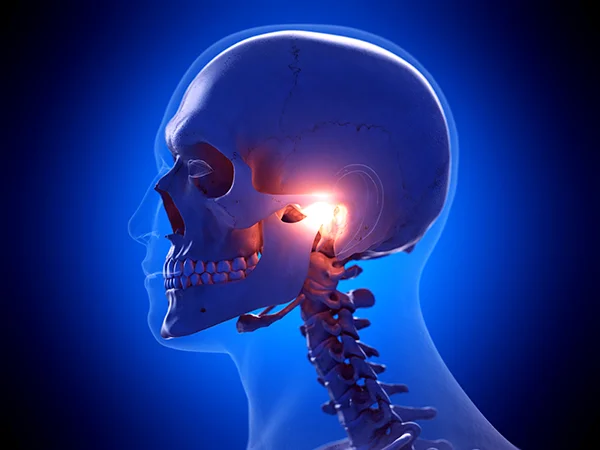TMJ The temporomandibular joint (TMJ) is the joint that connects your jaw and your temporal bones in front of your ears. At times, people can experience pain, stiffness, and other uncomfortable symptoms associated with this joint. These issues are often categorized under the umbrella label of TMJ disorders (TMD), with TMJ and TMD being used as interchangeable terms. Aside from general pain and discomfort, you could also experience tiredness, headaches, lockjaw, and a clicking noise in the jaw. We have many treatment options available here at Leavenworth Family Dental. The temporomandibular joint (TMJ) is the joint that connects your jaw and your temporal bones in front of your ears. At times, people can experience pain, stiffness, and other uncomfortable symptoms associated with this joint. These issues are often categorized under the umbrella label of TMJ disorders (TMD), with TMJ and TMD being used as interchangeable terms. Aside from general pain and discomfort, you could also experience tiredness, headaches, lockjaw, and a clicking noise in the jaw. We have many treatment options available here at Leavenworth Family Dental.Causes and Risk FactorsThere are many different causes and risk factors of TMJ/TMD. For instance, genetics can play a role as can stress and other disorders. Habits, such as nail-biting, or constantly leaning with your hand on your cheek can contribute to this stiffness. Eating hard foods can also cause the joint to flare up. In addition, teeth grinding, also called bruxism, is a major cause of TMJ/TMD and related disorders. This occurs throughout the night and can also be caused by stress. With this disorder, you would also notice pain in the teeth or even noticeable damage. DiagnosisBecause TMJ/TMD has many different causes, diagnosis is not always clear-cut. Our dentist will discuss your symptoms with you at an initial consultation. They would also listen for a clicking noise, feel your jaw for mobility and tension, and take digital imaging scans to view the structure of the jaw. They may recommend follow-up diagnostic, such as arthroscopy. This is a minor surgical procedure that lets our dentist view inside the jaw joint so that they can see the structure and inflammation. TreatmentAt the most basic level, our dentist may prescribe pain medication or low-dose anti-depressant. This can help relieve stress if it happens to be the cause of your condition, but it can also treat pain and tension. Muscle relaxants may also be prescribed. If the condition persists after medication, then our dentist would recommend an oral appliance or another type of therapy. Oral appliances, such as nightguards, can help to reposition your jaw and prevent you from grinding your teeth at night. You can get these over-the-counter, though they are not as effective as our custom-made nightguards. We also offer various dental restorations if the issue is with the bite, rather than with grinding the teeth. Physical therapy may be used alone or in conjunction with other treatments. Here, the physical therapist would show you mobility and strengthening exercises for your jaw as well as administer heat and ice as needed. Electrical nerve stimulation, radio waves, or low-level laser therapy could also be used to loosen the joint. If the condition is severe, then surgery may be the best option. Arthrocentesis allows our dentist to flush out the joint of any inflammatory debris. Similar to this, but not quite a surgical route, is trigger-point injections. Open-joint surgery is more complex and may involve the removal or reshaping of tissue. This may be used if you have worn down bone structure, tumors or growths, scar tissue, or bone chipping. Contact Leavenworth Family Dental at 913-682-1550 today for additional information on TMJ/TMD. |